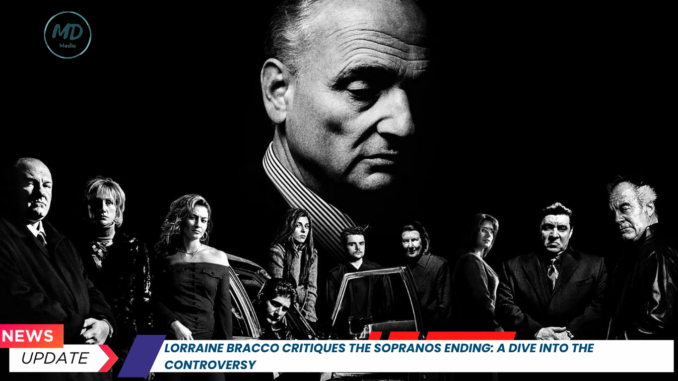
Introduction: The Sopranos Finale That Divides Fans
The final moments of The Sopranos remain one of television’s most debated endings. With its sudden cut to black, fans have grappled with what it all means for Tony Soprano. Lorraine Bracco, who played the insightful Dr. Jennifer Melfi, recently opened up about her feelings on the finale, and she’s not holding back. Let’s dive into her critique, explore the creator’s vision, and discuss why this ending still sparks heated conversations.
Bracco’s Take on the Finale: It Was Bad and Wrong
Lorraine Bracco is no stranger to the Sopranos universe. As Tony’s therapist, she witnessed the gangster’s complexities firsthand. However, when it comes to the finale, her feelings are far from warm.
“How Do You Just Walk Away?”
Bracco expressed her discontent bluntly during an appearance on The Spotlight With Jessica Shaw. She described her annoyance, stating, “I thought it was bad and wrong. I was annoyed. I told him, ‘How do you invest five years into someone’s life and just walk away?’ I said, ‘That is not cool.’”
This sentiment echoes the thoughts of many viewers who felt left in the lurch. The ambiguity surrounding Tony’s fate leaves a bitter taste, especially after so much character development. Fans invested in Tony’s journey expected a more definitive conclusion.
The Idealistic Reunion: A Therapist’s Dream
Despite her criticism, Bracco does hold onto a thread of hope regarding the finale. She imagines a world where Tony and Melfi meet again, perhaps in a more casual setting. “Honestly, I think they bumped into each other in restaurants and stuff like that,” she mused. “I think part of me wants to believe that she took a moment away from him, and they got back together, back in therapy. I could believe that.”
This longing for a reconnection highlights the depth of their relationship and adds a layer of what-ifs to the finale. After all, wouldn’t it be nice to see Tony, perhaps a bit changed, seeking help again?
David Chase’s Vision: Art or Frustration?
While Bracco voiced her concerns, series creator David Chase had his own reasons for the abrupt ending. His perspective adds depth to the conversation about storytelling and audience expectations.
The Diner Scene: A Concept Born from Observation
Chase’s vision for the finale struck him one day while driving. He stumbled upon a diner that sparked an idea: “It was kind of like a shack that served breakfast. And for some reason, I thought, ‘Tony should get it in a place like that.’”
This seemingly random inspiration highlights Chase’s artistic approach, grounded in reality yet shrouded in mystery. His choice to leave Tony’s fate ambiguous was intentional. Chase felt that fans wanted a clear-cut conclusion, but he was less inclined to deliver one.
Fan Frustration: The Desire for Justice
Chase’s reflection on fan reactions to the ending reveals his discomfort with their expectations. He noted, “They wanted to know that Tony was killed. They wanted to see him go face-down in linguini, you know?” His frustration stemmed from a belief that viewers had become too fixated on the idea of justice.
He posed a compelling question: “And now you want to see him killed? You want justice done? You’re a criminal after watching this sh*t for seven years.” This captures the essence of The Sopranos: it blurred the lines between right and wrong, making viewers question their own morality.
The Legacy of The Sopranos Ending
Cultural Impact: A Divisive Ending
The Sopranos’ finale has become a cultural touchstone, sparking debates about narrative choices and character arcs. Many fans express frustration over the lack of closure, while others appreciate the boldness of leaving Tony’s fate ambiguous. This division in opinion only enhances the show’s legacy.
A Reflection of Reality: The Ambiguity of Life
Chase’s approach mirrors the unpredictability of real life. Just as in reality, we often don’t receive clear resolutions to our stories. The choice to end the series in such a fashion can be viewed as a reflection of life’s uncertainties.
Lessons in Storytelling: Engaging the Audience
From a storytelling perspective, The Sopranos finale has taught us important lessons about audience engagement. While viewers often crave resolution, the most memorable stories can challenge those expectations. By leaving viewers with more questions than answers, Chase ensures that The Sopranos remains a topic of conversation long after the credits rolled.
Conclusion: Embracing the Complexity of The Sopranos
The Sopranos’ ending continues to elicit strong reactions, proving that great storytelling often lies in the gray areas. Lorraine Bracco’s candid critique adds depth to our understanding of the series and its characters. David Chase’s vision, though controversial, forces us to confront our expectations and the complexities of morality.
In a world where resolutions are often expected, The Sopranos reminds us that sometimes, it’s the questions that matter most. Whether you side with Bracco or Chase, one thing is certain: the legacy of The Sopranos will continue to spark discussion for years to come.
